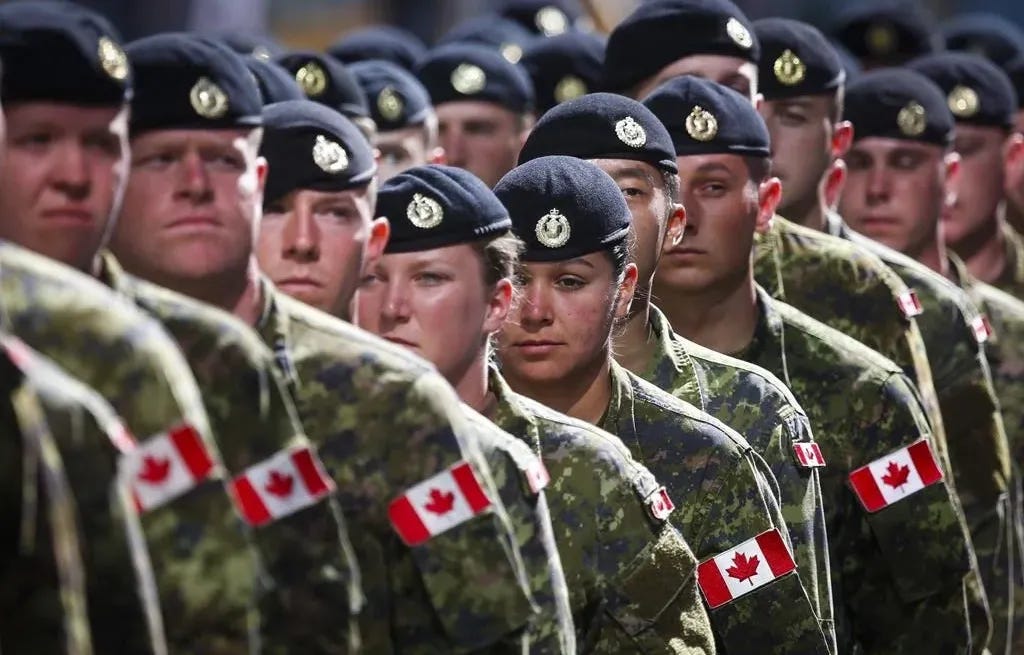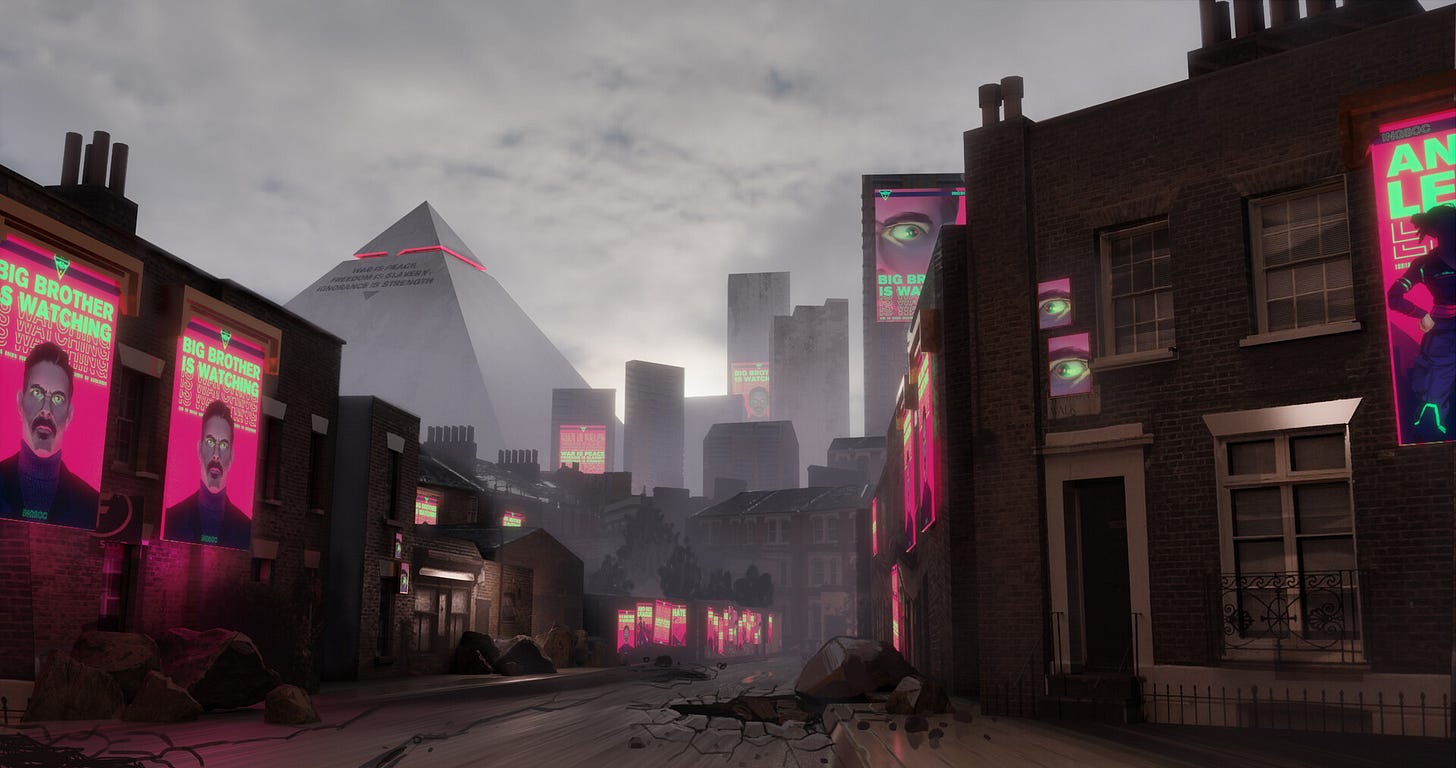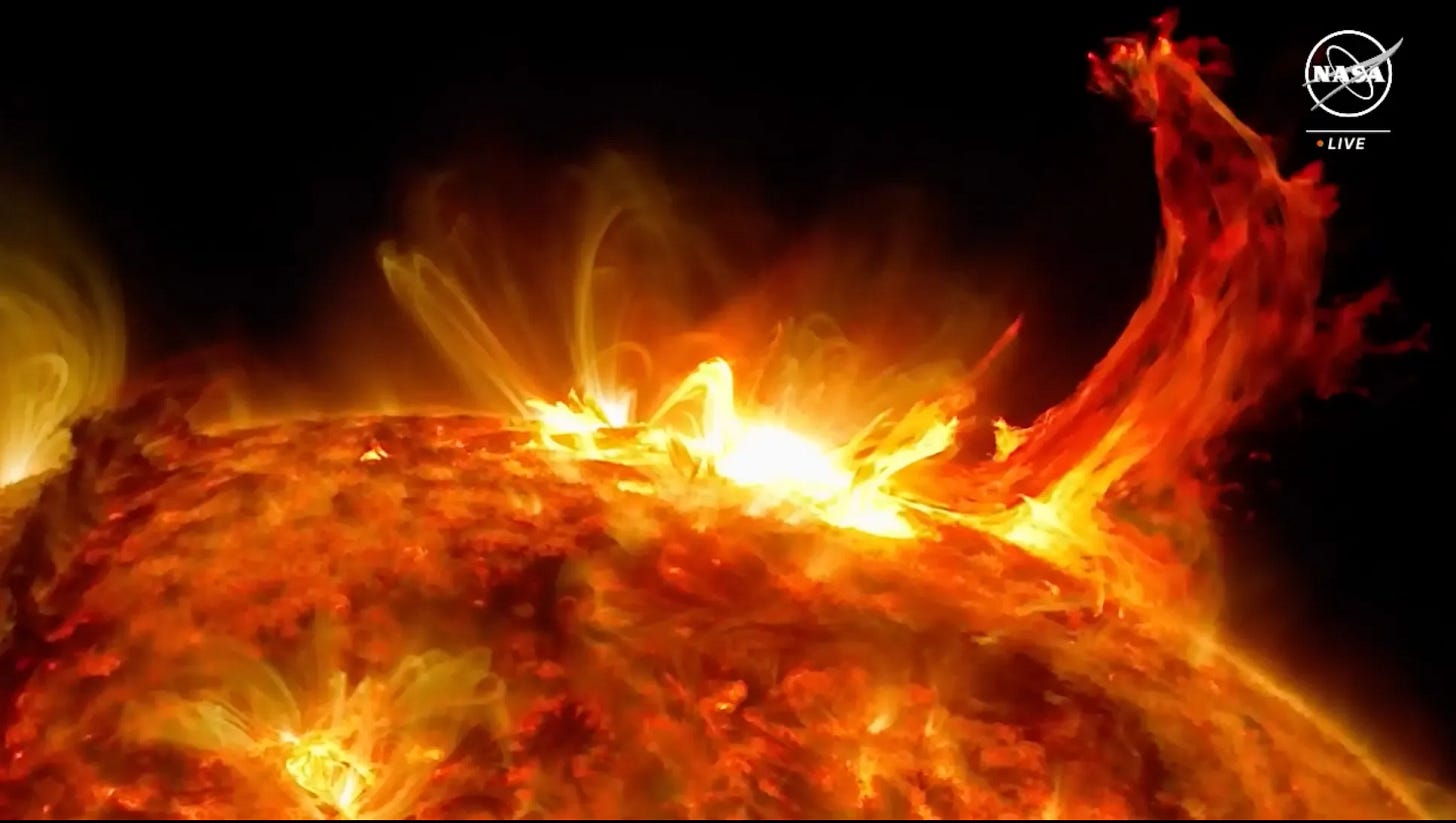Good morning, It’s Friday, May 16th. In today’s news, US launches a crackdown on cartels as Canada becomes the next trafficking hub, Canada’s military crisis leaves the nation exposed amid rising global threats, The psychology of atrocity—how evil spreads from the top down, Think tank calls for ‘Chretien-style’ cuts to the federal public service targetting 64,000 jobs, and much more.
First time reading the daily blend? Sign up here.
US Launches Crackdown on Cartels, But Canada May Be the Next Trafficking Hub
As the United States launches a full-scale war against the cartels poisoning its people, Canada is quietly becoming the perfect back door for the next wave of fentanyl devastation.
This week, U.S. prosecutors unsealed the first-ever narco-terrorism charges against senior leaders of the Sinaloa Cartel, following the largest fentanyl seizure in world history—1,500 kilograms from superlabs in Sinaloa. President Donald Trump’s Executive Order 14157 officially designated the Sinaloa Cartel as a Foreign Terrorist Organization, marking a new era where fentanyl producers are treated not as traffickers—but as terrorists.
These aren’t just criminal networks; they are insurgent organizations operating with military precision, marketing rainbow-colored fentanyl pills to children, stamping bricks with Louis Vuitton logos, and leaving thousands dead in their wake. The U.S. is responding with urgency, deploying special operations doctrine against drug lords as if they were ISIS.
And while American officials turn up the heat on Mexican cartels, the DEA is turning its attention north—issuing a chilling warning that Canada’s fentanyl superlabs are now a “growing concern” to U.S. national security. With Mexican supply chains under assault, Ottawa’s lucrative narco-industry is poised to fill the void. Superlabs in B.C. and Ontario are producing for global organized crime syndicates—some directly tied to Latin American cartels.
So where is Canada’s urgency?
Instead of targeting the cartels, B.C. authorities have launched police investigations—not into fentanyl traffickers—but into whistleblowers. After MLA Elenore Sturko leaked a government document showing safe supply drugs being trafficked on the streets, she was interrogated by anti-corruption police. The state moved faster to find the source of her information than it ever has to dismantle a fentanyl lab.
Even Premier David Eby admitted the probe violated whistleblower protections. But the damage is done. Canada is not just unprepared. It’s unserious.
While the U.S. treats this crisis like chemical warfare, Canada is playing PR games—censoring critics and shielding institutions. And as cartels pivot from Mexico to the Great White North, Canadians may soon find themselves on the frontlines of a narco-terror campaign their government refuses to acknowledge.
Canada’s Military Crisis: A Nation Exposed Amid Rising Global Threats
Once a symbol of national pride, Canada’s military is now a shadow of its former self—crippled by chronic underfunding, broken procurement, and a personnel crisis. As global tensions escalate and foreign powers push into North American airspace and waters, the Canadian Armed Forces (CAF) is increasingly sidelined, forced to rely on the United States for protection. The result? A nation vulnerable and unprepared.
Foreign Incursions Lay Bare Canada’s Defenses
In February 2025, Russian Tupolev bombers escorted by Su-35s entered the Alaskan Air Identification Zone near Canada’s Arctic frontier. US F-35s responded swiftly—Canada did not. When Russian aircraft returned on April 15, they were tracked by NORAD but faced no Canadian resistance.
These are not isolated incidents. Last July, Russian and Chinese warships sailed together through the Bering Sea. In September, their coast guard vessels were spotted closer than ever to North American shores. And in 2023, a Chinese spy balloon floated over Canada before being shot down—by an American jet.
“We’re protecting Canada,” said Donald Trump in a recent Oval Office meeting with Prime Minister Mark Carney, criticizing what he called “free military support.” His comments highlighted the uncomfortable truth: Canada’s defense rests on American shoulders.
A “Boutique” Force in Freefall
“We are unarmed and undefended,” warned retired Lt.-Gen. Michel Maisonneuve. He pointed to collapsing recruitment, aging equipment, and inadequate training as signs of a military in crisis. With just 64,000 active members and 23,000 reservists, the CAF is nearly 14,000 troops short. A recent survey showed fewer than 1% of students consider it a desirable career.
Scandals, weak leadership, and a damaged public image are bleeding the ranks. Meanwhile, most key military equipment is outdated or broken—some fleets are under 50% serviceable, and training resources are stretched thin. “Lots of Canadian military equipment is parked by the fence,” said Maisonneuve.
Underfunded, Underequipped, Unready
Canada has failed to meet NATO’s 2% GDP defense target, sitting at just 1.37% in 2024. Even its promise to hit 2% by 2030 is widely seen as too little, too late. “Two per cent is the minimum. We need three,” said Maisonneuve.
Procurement is paralyzed. Canada returns hundreds of millions to the treasury each year simply because it lacks staff to manage acquisitions. Experts are calling for off-the-shelf purchases—like F-35s, P-8s, and Reaper drones—to fast-track modernization. But even the 2023 F-35 deal is under review due to tensions with Washington, threatening interoperability and retaliation against Canadian defense firms.
“We can’t even spend the money,” noted Paul Mitchell of the Canadian Forces College. “There’s no one to run the projects.”
Arctic: Ground Zero for Geopolitical Competition
Nowhere is Canada’s vulnerability more obvious than in the Arctic. Melting ice is opening new shipping routes and triggering Russian and Chinese expansion. Canada lacks the submarines, icebreakers, and forward bases to assert control over its own backyard.
“Should we not be able to patrol our North with working submarines?” Maisonneuve asked. Planned investments—like two new icebreakers and a $6B early-warning radar system—are positive, but insufficient. Some experts argue Canada needs at least 12 submarines to defend its Arctic frontier, far beyond current capabilities.
Operation Nanook has been upgraded to an “all-domain” defense exercise, but Canada’s ability to detect, deter, and defend remains in doubt.
The Ukraine Wake-Up Call
Ukraine’s battlefield innovations—cheap drones, fiber-optic weapons, and agile supply chains—have reshaped modern warfare. Canada is far behind. Last year, the CAF handed out prizes for counter-drone tech, but most critical systems are still in development.
Upcoming River-class destroyers and F-35s offer high-tech defense, but with strings attached—key systems are controlled by the US. Carney is now exploring alternatives like Sweden’s Gripen or France’s Rafale to reduce dependency.
The Path Forward: Urgency or Irrelevance
Experts agree: Canada needs more money, faster procurement, and a smarter recruitment strategy focused on technical talent. Ties to EU defense initiatives may help, but the window is closing fast.
“Trump will come and go,” said former intelligence adviser Vincent Rigby, “but we’ll still share this continent.”
The Fireproof House Has Burned
Canada once fancied itself a “fireproof house” in a dangerous world. “I just don’t think it is anymore,” warned Lt.-Gen. Steve Boivin. He praised CAF members’ dedication—citing a daring helicopter rescue off Newfoundland—but admitted the system is under strain.
Without urgent reform, Canada risks permanent relegation to observer status in its own defense. Allies may still lend a hand. Adversaries won’t.
The Psychology of Atrocity: How Evil Spreads from the Top Down
Evil doesn’t erupt from the masses—it trickles down from those who understand how to manipulate them. The question isn’t why people comply. It’s who commands them to.
Modern psychology, as laid out by Andrew Lobaczewski in Political Ponerology, reframes the nature of evil—not as an abstract or religious concept, but as a real, measurable dynamic rooted in psychological pathology. Evil, according to psychologist Philip Zimbardo, is simply this: using power to harm, abuse, dehumanize, or destroy innocent others—or enabling others to do so on your behalf. And that’s precisely how authoritarian systems are built: not by the will of the majority, but by the cunning of the few who know how to bend the majority to their will.
The Milgram and Zimbardo experiments taught us something unsettling. Most people will follow cruel orders under pressure from authority, even if it causes them immense psychological distress. But the real question isn’t why people obey—it's who gives the orders. Who designs the conditions that coerce ordinary people into committing acts they would never otherwise consider? That’s the true source of evil: the policy-makers, the tyrants, the psychological manipulators.
Lobaczewski argues that society’s hierarchies, through processes like negative selection and ideological indoctrination, are increasingly populated by individuals with innate personality disorders. These are not merely greedy or ambitious people. They are individuals whose brains are wired differently, capable of cruelty without conscience. They rise to power by traumatizing those around them, especially the young, and by mobilizing the disaffected with promises of justice or revenge.
At scale, this dynamic becomes a machine. A small nucleus of disordered elites, backed by corrupted institutions, spellbinds the population. They manufacture hysteria, amplify division, and punish dissent. Tyrants at the top are mirrored by mini-tyrants at the bottom. The majority adapts to survive, sacrificing conscience for comfort, normalizing abnormality.
Evil isn’t random. It’s systemic. It grows like a virus, exploiting cracks in the human psyche and scaling upward through bureaucracy, ideology, and fear. Recognizing that doesn’t make us cynical—it makes us vigilant.
Because history doesn’t repeat itself. People do. Especially the ones who feel nothing when they hurt others—and know exactly how to make the rest of us go along with it.
Think Tank Calls for ‘Chretien-Style’ Cuts to Federal Public Service—64,000 Jobs Targeted
A report by the Montreal Economic Institute is urging the federal government to cut 64,000 public service jobs and reduce spending by $10 billion through a sweeping review of federal programs—mirroring the successful 1994 Chrétien-era reforms. With the public service ballooning by over 100,000 positions since 2015, the MEI argues that bold, strategic reductions are needed to restore fiscal discipline and curb bureaucratic bloat. Despite modest Liberal plans to trim 5,000 positions, the MEI says far more decisive action is essential to ensure long-term economic stability. More
Survey: Hiring Managers Say New College Grads Not Working Out
A survey of 1,000 hiring managers found that 65% had to fire recent college grads within their first year due to poor work habits—most notably excessive phone use , entitlement, lack of preparedness, weak work ethic, and poor communication. Other issues included inappropriate attire, foul language, lateness, and missed deadlines. Seventy percent of companies said they had to place new grads on performance improvement plans. Critics blame universities for failing to teach workplace norms, while employers now prioritize candidates with any prior job experience. Only 58% of companies plan to hire from the class of 2025, with many seeking self-starters who show initiative, adaptability, and a strong attitude toward work. More
Texas Mother Accused of Terrorism for Buying Ammunition and Helping Son Plan School Shooting - More
Alberta Court Finds in Favour of WestJet Employee Fired for Refusing COVID-19 Vaccine - More
Bloc Pursuing Legal Challenge to ‘Rerun the Election’ After Losing Quebec Riding to Liberals by a Single Vote - More
China Spies:
Rogue Communication Devices Found in Chinese Solar Power Inverters - More
Lawmakers Urge Commerce Department to Ban China-Linked Router Company - “China is not our friend, and we should not bring CCP-controlled equipment into American homes,” Sen. Cynthia Lummis. More
Mexican Judge Arrested Over 2014 Disappearance of 43 Students - Lambertina Galeana Marín, former president of Guerrero’s Superior Tribunal of Justice, is suspected of ordering the disappearance of key CCTV footage related to the disappearance of 43 trainee teachers. More
Ukraine, Russia to Engage in Istanbul-Hosted Talks Without Zelenskyy, Putin or Trump - Critics argue this is basically performative at this point, expecting that zero progress will be made. More
Canadian Home Sales Down Almost 10% Annually
Canadian home sales dropped 9.8% in April compared to last year, with just over 44,000 homes sold, as the market remains subdued amid ongoing economic uncertainty and trade tensions. CREA says the housing market has returned to the sluggish pace seen since 2022, with buyers staying on the sidelines. The national average home price fell nearly 4% year-over-year to $679,866, while new listings also dipped slightly. Inventory levels rose in BC and Ontario but remain tight elsewhere. Economists warn that if economic conditions worsen, more forced sales could hit the market. More
Hudson’s Bay to Sell Name, Stripes, Bands to Canadian Tire for $30 Million - More
Ontario Budget Forecasts $14.6 Billion Deficit, Slower Growth in Wake of US Tariffs - More
Dick's Sporting Goods to Buy Foot Locker for $2.4 Billion to Fight Soft Demand - More
“A New Worst Case Scenario”—Prehistoric Solar Storm Was 500x Stronger Than Any in Modern History
Scientists have discovered the most powerful solar storm ever recorded struck Earth in 12,350 BC, during the end of the last Ice Age. This "solar particle storm" was over 500 times stronger than any recorded in modern times and 18% stronger than the famous AD 775 event. Using tree rings and radiocarbon dating, researchers traced the massive spike in solar activity, marking it as the only known event of its kind outside the Holocene epoch. The finding sets a new upper limit for solar storm intensity and highlights the potential threat such storms pose to modern infrastructure like satellites and power grids—it would cripple modern infrastructure if it hit today. More
Study: Eureka Moments Double Memory by Rewiring the Brain - More
PGA Championship: Who Are These Guys? Stars Fade as Lesser-knowns Take Center Stage
In a surprising start to the PGA Championship at Quail Hollow, lesser-known names dominated the leaderboard. Jhonattan Vegas, ranked 70th in the world, leads at 7-under after an impressive 64. He's followed closely by Cam Davis and Ryan Gerard at -5. Remarkably, no top-10 players in the world rankings are in the top 10 after Round 1—only the second time that's happened in PGA Championship history.
Big names struggled: Rory McIlroy (+3), Jordan Spieth and Brooks Koepka (+4), and Dustin Johnson (+7) all fell behind. World No. 1 Scottie Scheffler sits at -2, still in contention but chasing a crowded field. More
Singer Chris Brown Charged in UK for Alleged Attack at London Night Club in 2023 - More
Barcelona Wins La Liga Title in Hansi Flick's First Season as Head Coach - More
Tiny Titan: Ontario Woman Believes Her 3-Inch, 1-Pound Yorkie May Be the Smallest Dog on Earth
Pet Raccoon Caught with Meth Pipe in its Mouth When Cops Pulled Over Ohio Woman: 'Expect the Unexpected'
On This Day in 1920, French heroine Joan of Arc is canonized as a saint by Pope Benedict XV



















Good morning,
We enjoy listening to you podcasts and find it very informative. While we would love to share it and encourage others to listen, we find the language used is of poor taste. The f-bombs used by such articulate men is unnecessary and begs a discernment of your message. Given that you are clearly intelligent men, why stoop so low as to use unnecessary profanities?